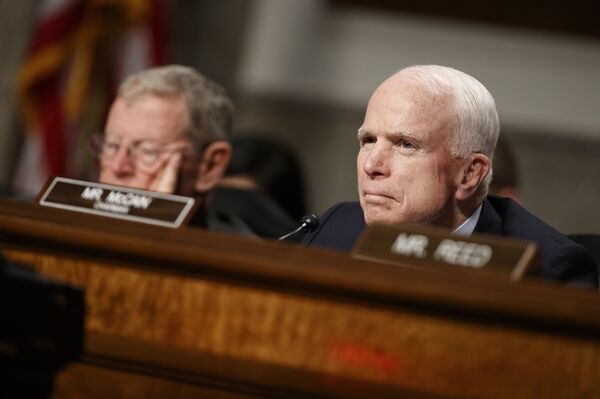What lies at the root of all that fuss?
Ardayev explains that Gorsuch's confirmation will give hope to President Trump that his executive order on migration will be finally unfrozen. Furthermore, it will also allow the Republican Party to gain the upper hand over the Democrats in all three branches of power — legislative, executive and judicial.
Needless to say, the Democratic Party was determined to do whatever it takes to upset the Republican applecart.
"Senate Democrats on Thursday successfully filibustered President Trump's Supreme Court choice, depriving Judge Neil M. Gorsuch's nomination of the 60 votes needed to advance to confirmation," Lisa Mascaro of the Los Angeles Times reports.
On Monday Trump's nominee won approval on a party-line vote from the Senate Judiciary Committee prompting Democratic lawmakers to pledge to filibuster the Supreme Court nomination of Gorsuch later this week.
For their part, the Republicans vowed to confirm Gorsuch by the end of the week, threatening to trigger the "nuclear option": they may change Senate rules to approve Trump's nominee with a simple majority without gathering 60 votes to overcome a filibuster.
"Benjamin Franklin is somewhere turning over in his grave," Republican Senator John McCain, who made substantial efforts to preserve a filibuster, said, as quoted by Jennifer Steinhauer of The New York Times.
The journalist specified "the rationale behind the filibuster was that a 60-vote threshold meant that a broader consensus would have to be reached for the most contentious legislation."
However, by weaponizing the "nuclear option" Republicans will set a trap for themselves: if the Democrats win the majority in the Senate in 2018 they will obviously take advantage of their political opponents.
"On the more important long-term front, killing the filibuster will allow the Democrats to bypass the de-facto supermajority rule that has prevented them from passing legislation whenever they have control of congress," Joshua Spivak of Hugh L. Carey Institute for Government Reform noted in his article for CNBC.
Ardayev recalled that the "nuclear option" was used only once in 2013 by the Democrats, who took this step to overcome the Republicans who deliberately dragged out the process of considering candidacies offered by Barack Obama for positions in the presidential administration and federal courts.
"The 'nuclear option' is really an extreme measure, because the political consequences of such a step could be unpredictable and lead to paralysis of the work of the Senate. In 2005, in response to the threat of using it, Democratic senators promised to completely block the activities of the Chamber, and the Republican majority had to retreat," Ardayev underscored.
"The answer isn't to change the rules. The answer is to change the nominee," Senate Minority Leader Charles E. Schumer (D-N.Y.) commented on the matter, as quoted by The Washington Post.
The question then arises whether that onion is really worth peeling.
Ardayev believes that Trump has good reasons for pushing ahead with Gorsuch's appointment.
"[Judge Neil Gorsuch] is a supporter of conservative values, he adheres to the principle of literal interpretation of laws in contrast to the use of precedent, which role should be significantly reduced in the American court process, according to Gorsuch," the Russian political analyst explained.
Ardayev called attention to the fact that Donald Trump has repeatedly highlighted Gorsuch's approach saying that the latter respects the laws and the Constitution and interprets them the way they were written. The US President is convinced that the qualification of the candidate he proposed "is beyond doubt."





